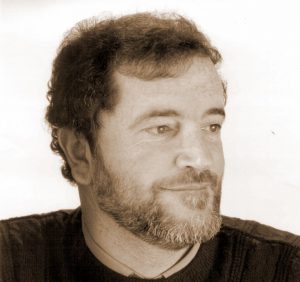To Beautify the Gaze by John O’Donohue

Photo credit Zolman Pollak
“My earliest memories are of the landscape of The Burren in the West of Ireland. The Burren is an ancient kingdom of limestone sculptures carved slowly by rain, wind and time.” —John O’Donohue
The human gaze is not the closed, fixed view of a camera, but is creative and constructive. Both the gaze that sees and the object that is seen construct themselves simultaneously in the one act of vision. So much depends then on how we see things. More often than not the style of gaze determines what we see.
There are many things near us that we never notice simply because of the way we see. The way we look at things has a huge influence on what becomes visible for us. if a house has been closed for a long time, a film of dust settles on the windows. Decayed residue gradually manages o seal out the light. When we go into such a place, we smell the dankness of sour and fetid air.
The same thing can happen in rooms of the mind. If one has become stuck in a certain narrow or predictable way of seeing, the outside light cannot bring colour into one’s life. Eventually, the windows of the mind become blinded by an imperceptible film of dead thought and old feeling so that the air within becomes staale, life lessens and the outside world loses its invitation and challenge. When no fresh light can come into the mind, the colour and beauty fade from life.
There is an uncanny symmetry between the inner and the outer world. Each person is the sole inhabitant of thir own inner world; no-one else can get in there to configure how things are seen. Each of us is responsible for how we see, and how we see determines what we see.
Seeing is not merely a physical act: the heart of vision is shaped by the state of soul. When the soul is alive to beauty, we begin to see life in a fresh and vital way. The old habits of seeing are broken. The coating of dead dust falls from the windows. Freed from their dead forms the elements of one’s life reveal new urgency and possibility.
We have often heard that beauty is in the eye of the beholder. This is usually taken to mean that the sense of beauty is utterly subjective; there is no accounting for taste because each person’s taste is different.
The statement has another, more subtle meaning: if our style of looking becomes beautiful, then beauty will become visible and shine forth for us. We will be surprised to discover beauty in unexpected places where the ungraceful eye would never linger. The graced eye can glimpse beauty anywhere, for beauty does not reserve itself for special elite moments or instances; it does not wait for perfection but is present already secretly in everything. When we beautify our gaze, the grace of hidden beauty becomes our joy and our sanctuary.
Excerpt from BEAUTY: The Invisible Embrace by John O’Donohue

JOHN O’DONOHUE (1956-2008) was a poet, philosopher, scholar, and native Gaelic speaker from County Clare, Ireland. He was awarded a Ph.D. in philosophical theology from the University of Tübingen, with postdoctoral study of Meister Eckhart. John’s bestselling books Walking in Wonder, Anam Cara: A Book Of Celtic Wisdom, Beauty, Eternal Echoes: Celtic Reflections on Our Yearning to Belong, and the beloved To Bless the Space Between Us, among many others, guide readers through the landscape of the Irish imagination.
John’s legacy directs our search for intimacy to crucial thresholds: tradition and modernity, past and future, life and death, the visible and the invisible world. At the heart of John’s awakened beliefs was the premise that ancient wisdom could offer desperately needed nourishment for the spiritual hunger experienced in our modern world. John is fondly remembered by an international readership as one who could blend critical analytic thought with imaginative evocation, enabling people to release themselves from the false shelter of the familiar and repetitive to become agents of transformation and change.
“We respond with joy to the call of beauty because in an instant it can awaken under the layers of the heart a forgotten brightness. Plato said: ‘Beauty was ours in all its brightness…Whole were we who celebrated that festival’ (Phaedrus).”
